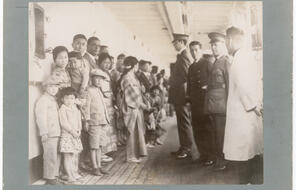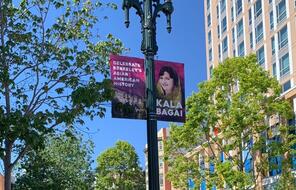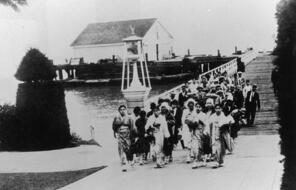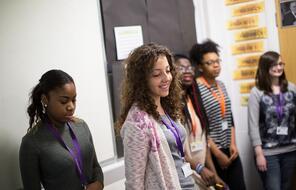Paper Sons and Daughters and the Complexity of Choices During the Exclusion Era
At a Glance
Subject
- History
- Social Studies
- Democracy & Civic Engagement
- Human & Civil Rights
- Global Migration & Immigration
- Racism
With so few opportunities to legally immigrate to the United States during the exclusion years, some Chinese immigrants came into the country without accurate legal documentation, under what is known as the “paper son” system. The majority arrived through Angel Island.
The “paper son” system involved an immigrant buying papers from a Chinese American citizen who agreed to pretend to be the immigrant’s relative, because immediate family members of American citizens could be legally admitted under the exclusion law. During an interview conducted after the Chinese exclusion law was repealed, one immigrant who resorted to this method, Mr. Chan, explained his reasons for entering the United States as a “paper son”:
We didn't want to come here illegally, but we were forced to because of the immigration laws. They particularly picked on the Chinese. If we told the truth, it didn't work. So we had to take the crooked path. 1
Many otherwise law-abiding Chinese Americans aided Chinese immigrants entering under the “paper son” system. Historian Erika Lee writes about one merchant’s views on the issue:
A well-known Chinese merchant in Seattle . . . reportedly told the assistant Commissioner of immigration there that while he was a scrupulously law-abiding resident, he “did not hesitate to help . . . and protect . . . a fellow countryman” attempting to enter the country fraudulently. “It is not wrong, under the Chinese moral law,” he explained, “for a Chinaman to swear falsely in support of an application made by a fellow clansman to gain admission into the United States.” When asked why not, the merchant reportedly said, “because God never said that the Chinaman shouldn't come to this country.” 2
Even if it was a decision that many Chinese Americans empathized with, the choice to follow the “crooked path” and enter the United States as a paper son or daughter had real consequences for Chinese immigrants. For one, the individual and his or her family always lived in fear of the very real possibility that they could be discovered and deported at any moment, or that those who helped them would also be caught and deported. These fears, coupled with shame about being in the United States illegally, took an emotional toll that rippled across generations. Historian Erika Lee’s grandfather was a paper son, something that Lee didn’t discover until she became a graduate student studying the history of Chinese immigration in the United States:
I did not learn about [the history of Chinese exclusion] from my own family. One grandmother refused to talk about the “old days”—times that were full of pain and wounds that never healed. When I could coax her into talking about her past, I had to take surreptitious notes under the dining room table. Other relatives also placed a premium on secrecy, preferring—like many Chinese Americans—to keep the years of exclusion buried. 3
Similarly, Byron Yee discovered that his father and uncle came to the United States as paper sons after he started uncovering old records. Before he began investigating his family history, he had heard “nothing about my father’s history, about his past.” Yee continues:
It kind of floored me because all of a sudden it made a lot of sense—why he was the way he was, why he never really talked about his past, why he was very secretive. It explained a lot about him and about his history. 4
While some may condemn those from the past for breaking our country’s immigration laws, scholar Ben Railton urges us to think differently about these choices. For one, Railton notes that the immigration laws that the paper sons and daughters were breaking were explicitly racist and unjust. Those laws meant that certain immigrant groups, such as western Europeans, faced few or no hurdles to immigrate to the United States for most of the nation’s history. Others were subjected to intense scrutiny or, like the Chinese and other Asians, banned almost entirely from entering the nation. This complicates the idea that paper sons and daughters “chose” to break the law when they could have entered the country through the proper channels. Railton writes:
Any narrative . . . that treats the difference between legal and illegal immigration as a matter of choice, of how different arrivals responded to the same (or even similar) circumstances, rules, or possibilities, is disconnected from the realities. . . . [E]very significant immigration law prior to 1965 . . . was designed and intended to discriminate explicitly between different nationalities and communities. 5
These observations are important to keep in mind when comparing family immigration stories between different immigrant groups. Educator Kevin Jennings explains:
When people say “my ancestors came here legally,” they’re probably right. For the first century of the country’s existence, anyone could land here and walk right off the boat with no papers of any kind. . . . [After the Chinese exclusion laws were passed in 1882,] if you were an able-bodied, non-Chinese person, you could come “legally” for several more decades. 6
It was not until 1924 that the US government broke from its long tradition of letting most immigrants into the country with very few regulations. That year, the US Congress passed the Johnson-Reed Act in order to set limits on the maximum number of immigrant visas that could be issued per year to people born in each country. These quotas were designed to limit the immigration of people considered “racially undesirable,” notably southern and eastern Europeans. The act also barred people born in Asia and Africa from immigrating to the United States.
When people say that their ancestors “came here legally,” then, a more accurate statement for many would probably be: “My ancestors did not break the law by entering the United States, because there were no such laws at the time.” For many Americans, it is impossible to know what their ancestors would have chosen to do if faced with restrictions designed to keep them out of the United States. Would those ancestors’ desire for safety and opportunity in the United States have meant that they would have sought a way around laws in place to keep them out? Most immigrants who came before 1924 were lucky enough not to have to choose.
This relates to a concept called “moral luck”: the idea that our choices are often constrained by the ways we perceive the options available to us in any particular time, place, and circumstance. The concept of moral luck raises questions about the judgments we make about people from the past: Can we praise those who came here “legally” when there were no laws conflicting with their goals and no dilemma requiring a moral choice? Similarly, can we fault Erika Lee’s and Byron Yee’s ancestors, who immigrated illegally at a time when very few Chinese were allowed to legally immigrate? Byron Yee believes we cannot. He challenges us not to morally distance ourselves from the choices his father and uncle made as paper sons:
You see my story is no different from anyone else’s. . . . In all of our collective past, we’ve all had that one ancestor that had the strength to break from what was familiar to venture into the unknown. I can never thank my father and uncle enough for what they had to do so that I could be here today. One wrong answer between them and I would not be here. 7
- 1Quoted in Erika Lee, At America’s Gates: Chinese Immigration during the Exclusion Era, 1882–1943 (University of North Carolina Press, 2003), 189.
- 2Ibid., 192–193.
- 3Ibid., 5–6.
- 4An Educator’s Guide to “Becoming American: The Chinese Experience” (Facing History and Ourselves, 2003), 29.
- 5Ben Railton, The Chinese Exclusion Act: What It Can Teach Us about America (Palgrave MacMillan, 2013), 17–18.
- 6Kevin Jennings, “Op-Ed: Yes, your ancestors probably did come here legally—because ‘illegal’ immigration is less than a century old,” Los Angeles Times, January 14, 2018.
- 7An Educator’s Guide to “Becoming American: The Chinese Experience” (Facing History and Ourselves, 2003), 29.
How to Cite This Reading
Facing History & Ourselves, "Paper Sons and Daughters and the Complexity of Choices During the Exclusion Era," last updated January 12, 2023.
This reading contains text not authored by Facing History & Ourselves. See footnotes for source information.













